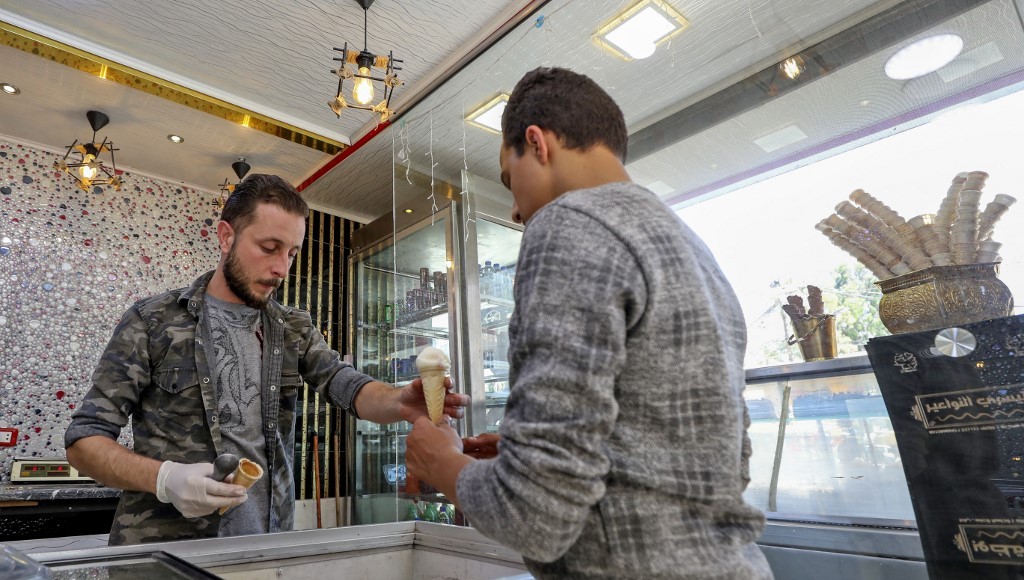In his pastry shop in the northwest of war-torn Syria, Abu Emad can finally display his mouth-watering eclairs without fearing a power cut now that he receives electricity from neighboring Turkey.
“Electricity is the backbone of my business,” said the elated 31-year-old, inside his family business in jihadist-dominated Idlib city. “Without it, I can’t work.”
After years of squandering savings on unreliable private generators, he now pays a Syrian company Turkish lira to provide his shop with an almost continuous supply of Turkish-generated power.
His humming fridges are just one facet of Ankara’s growing influence in northwest Syria, where Turkish charities are helping displaced families by building homes.
Connection to Turkish power has been life-changing for many like Abu Emad, both in Idlib city and the wider region, who have had no reliable supply since Damascus pulled the plug after the area was overrun by rebels in 2012.
“Before, we’d make only one or two kinds of pastries, but now we’ve started making all sorts and filling up our fridges because we can keep them on again,” the business owner said.
Hospitals, flour mills
Outside the Idlib region, in areas Turkey and its Syrian proxies have seized along the border since 2016, Ankara has set up a de-facto protectorate.
There, Turkish currency, schoolbooks, road signs, post offices and telecom services have become a part of everyday life.
But Turkish influence had until now been slower to trickle into the Idlib region, where a so-called “Salvation Government” with ties to Syria’s former Al-Qaeda affiliate is still in charge.
Turkey backs some rebel groups inside the stronghold, but its troops have remained deployed strictly along its edges under a 2020 ceasefire deal with the Damascus regime and its principal backer Moscow.
Across Idlib city in recent weeks, however, men in yellow vests employed by a Syrian firm called Green Energy have been laying down cables to bring in power from Turkey.
Director Osama Abu Zeid said the company was operating with the full approval of both Ankara and the Idlib authorities.
In Idlib city and some other areas near the border, it has since May started providing businesses — as well as hospitals, water stations, bakeries and flour mills — with power for more than half the day, he said.
Using existing public and private networks for now, it was also working to provide homes with 10 hours of electricity at a rate of 50 Turkish lira ($5) per ampere, he said.
In recent years, residents have relied mostly on private generators, though some have also started switching to solar power.
Abu Zeid said the project now bringing in Turkish power was not politically motivated, but instead aimed to “alleviate our people’s suffering” and revive the region’s economy.
He also said the company had “no affiliation with the Salvation Government” running the Idlib region, and that the administration would not share in the profits.
The local authorities would only police the network, and hold accountable anyone who intentionally damaged it, he said.
‘Keep the Syrians in Idlib’
On Turkey’s southern doorstep, the Idlib region is home to almost three million people, two-thirds displaced from other parts of Syria during the decade-old conflict, the United Nations says.
More than half live in sprawling displacement camps along the border.
In recent months, Turkish humanitarian agency IHH has worked to transform some of these tented settlements into “villages.”
By early May it had built 15,000 small cinderblock homes out of a planned total of 50,000 to be constructed by various Turkish organizations, IHH head Bulent Yıldırım told the Turkish press.
Ignited in 2011 by the repression of anti-government protests, Syria’s war has killed more than 500,000 people and displaced millions from their homes.
Turkey says it has already taken in 3.7 million Syrian refugees, and could not cope with anymore.
Analyst Dareen Khalifa, of the International Crisis Group, said building homes for the displaced or providing electricity in Idlib aimed “to halt a new wave of refugees” across the frontier.
“Turkey can’t afford economically or politically to absorb a new wave of refugees,” she said.
“They want to maintain the stalemate and keep the Syrians in Idlib on the other side of the border.”
AFP


